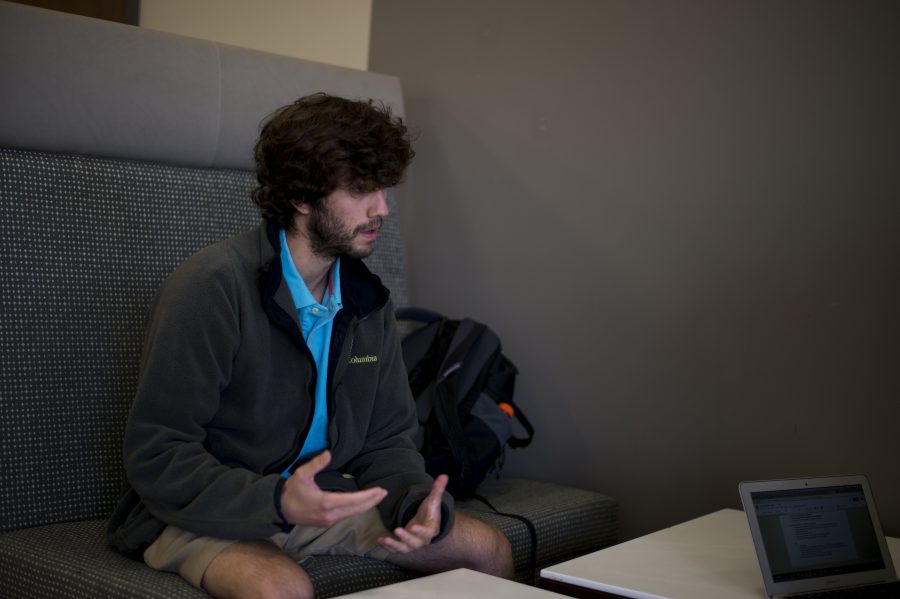Living with bipolar disorder as her primary diagnosis, Helmi Henkin is not ashamed of her mental health condition. In fact, she is deliberately open about it because of the stigma that surrounds it.
“I feel like representations of us in the media, or just people’s stereotypes in general, are either we’re these manic pixie dream girls from ‘Looking For Alaska’ or something, or just we need saving or we’re emotional rollercoasters … or we’re represented as these monsters who ruin our own lives or ruin our relationships without remorse or thought, but you know, we’re just people living with mental health conditions,” said Henkin, a senior majoring in psychology and French and president of the National Alliance of Mental Illness (NAMI) at the University. “Our diagnoses don’t define us.”
Henkin has lived with several mental health conditions because bipolar disorder often manifests depression, anxiety and obsessive-compulsive disorder (OCD). She has also been diagnosed with post-traumatic stress disorder (PTSD), and she said the difficulty that arises for those who live with it are the constant triggers and belittlement of their daily trauma.
She said the popularization of “I’m triggered” jokes are incredibly hurtful because joking about triggers further dismisses the experience of those who struggle with their trauma and perpetuates more negative mental health stigma. Offensive language, a direct manifestation of stigma, is a barrier between those struggling with mental health conditions and those who are not at the time.
“The weather isn’t bipolar, it’s fickle,” she said. “Someone’s not anorexic because they’re skinny. You’re not depressed because you failed that test. You didn’t have a panic attack because you lost your keys, and of course some people do, but you know, in general people make light of these mental health conditions and when they do that, they often inadvertently close themselves off from people who are living with these mental health conditions.”
Like Henkin, Ben Christiansen, a senior majoring in biology, and president of Living with ADD and ADHD, hears misrepresentations of both ADD and ADHD. He said he feels like ADD and ADHD have developed a reputation as an excuse for being lazy, with people saying, “I’m too ADD to do this.”
Christiansen struggled with his condition when he initially came to college. ADHD makes focusing on work difficult, which made him feel like he was falling behind.
“Freshman year it was a real struggle because you don’t realize how manageable a lot of your symptoms are, but it just takes an effort to start paying attention to them, and I was just unaware,” he said. “An assignment that would take the average person 30 minutes would take me like an hour and a half. So, you feel like you’re one step behind because you see people who can just kind of just flow through things and it kind of just all clicks for them and stuff like that, and it just didn’t happen for me.”
Lee Keyes, executive director of the Counseling Center, said stigma comes from a place of ignorance, one where people lack accurate information about what mental health issues are.
“People tend to think of [mental health] in a binary manner,” he said. “You’ve either got it, and that’s bad, or you don’t have it, and that’s good, when actually you can not have a diagnosed mental health issue and not be doing well in life at all. And, on the other end, you could have a condition and do very well in life.”
Keyes said he doesn’t know anybody who doesn’t have issues in their lives, physical or emotional. He said everybody has something that they’re dealing with, and the more people become aware of that reality and get educated and open about it, the more the stigma will diminish.
Henkin received treatment and knows the coping mechanisms that work for her, so her classwork doesn’t suffer. However, she said that isn’t the case for everyone.
“I am usually able to get out of bed and make myself go to class, and I think that’s probably because school is one of my coping mechanisms,” she said. “You know, keeping yourself busy. But I know for other people, they’ve had to medically withdraw because they can’t function, go to school and continue to deal with the mental health issues they’re having, or they’ve stayed at school and it’s tanked their grades. Whereas for me, throughout college, I’ve been able to keep a pretty good balance between school and what I have going on behind the scenes, even if it causes problems every once in awhile.”
Bryan Covington, a sophomore majoring in marketing and president of Active Minds at Bama, was diagnosed with generalized anxiety. She said she has anxiety under control, but sometimes she has to take a step back and go talk to someone.
“I’ve only really had issues with it when it comes to like, the classroom and speaking up in the classroom,” she said. “I had a hard time in classes when I know I have to be participating or participation is a big part of the grade. I don’t really like speaking up because I get really anxious about being wrong, so I freak out a lot.”
Keyes said succeeding in the classroom takes skills and effort for anyone.
“If you want to flourish [in the classroom], whether you have a condition or not, you have to know how to be a good student,” he said. “And that involves a lot more than what people think – it’s your habits, it’s your schedule, it’s time management, it’s stress management, it’s good study practices, good practices about taking exams, all of these things are learnable.”
Living with ADD and ADHD, NAMI and Active Minds at Bama are all groups on campus working to combat stigmas. NAMI is the largest grassroots mental health organization in the country, and the University has one of the few on-campus chapters and the only on-campus chapter in Alabama, Henkin said.
NAMI aims to provide education, advocacy and support on campus by referring people to the connection support group if that’s what they want, providing education about resources on campus and in the community and raising awareness about mental health conditions.
Christiansen said he was interested in finding people with ADD and ADHD who want to try to diminish their symptoms. He said he struggled to approach solutions with focusing and anxiety, so he created Living with ADD and ADHD to help others going through the same struggles.
“When I came to campus, I realized that there’s the Office for Disability Services, you know, they give you accommodations for testing and stuff, but I figured that there’s never really kind of like a social component to it, they’re just kind of like, ‘We’re here to help with your schoolwork.’” he said. “So, I designed this group to try to reach out to kids who have ADD or ADHD and still try to pursue their academics because I feel like a lot of people with ADD and ADHD, most of them just kind of realize that and kind of give in to it and just kind of chase after the easiest major they can get their hands on and just kind of try to get by instead of trying to overcome it,” he said.
Covington said Active Minds at Bama works to educate people about mental health and erase the stigma associated with it.
Keyes said people with mental health conditions should tell friends and loved ones about what to do to help and what not to do to. He said he thinks the more open someone is about a mental health condition, the more likely that person is to function well as a student and function with whatever condition that person has.
“You can’t inform [friends and loved ones] if you’re dealing with a lot of shame,” he said. “If you’re keeping it a secret, for whatever reason, and stigma can do that, it causes shame with people. But once you do away with that, you actually improve a good deal.”







